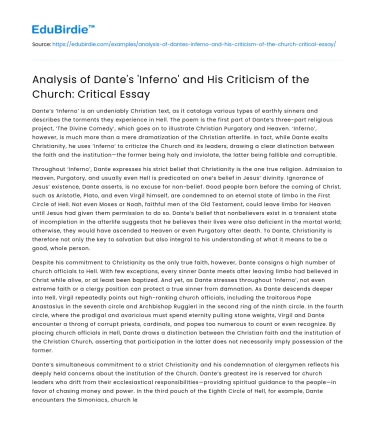Dante’s ‘Inferno’ is an undeniably Christian text, as it catalogs various types of earthly sinners and describes the torments they experience in Hell. The poem is the first part of Dante’s three-part religious project, ‘The Divine Comedy’, which goes on to illustrate Christian Purgatory and Heaven. ‘Inferno’, however, is much more than a mere dramatization of the Christian afterlife. In fact, while Dante exalts Christianity, he uses ‘Inferno’ to criticize the Church and its leaders, drawing a clear distinction between the faith and the institution—the former being holy and inviolate, the latter being fallible and corruptible.
Throughout ‘Inferno’, Dante expresses his strict belief that Christianity is the one true religion. Admission to Heaven, Purgatory, and usually even Hell is predicated on one’s belief in Jesus’ divinity. Ignorance of Jesus’ existence, Dante asserts, is no excuse for non-belief. Good people born before the coming of Christ, such as Aristotle, Plato, and even Virgil himself, are condemned to an eternal state of limbo in the First Circle of Hell. Not even Moses or Noah, faithful men of the Old Testament, could leave limbo for Heaven until Jesus had given them permission to do so. Dante’s belief that nonbelievers exist in a transient state of incompletion in the afterlife suggests that he believes their lives were also deficient in the mortal world; otherwise, they would have ascended to Heaven or even Purgatory after death. To Dante, Christianity is therefore not only the key to salvation but also integral to his understanding of what it means to be a good, whole person.
Save your time!
We can take care of your essay
- Proper editing and formatting
- Free revision, title page, and bibliography
- Flexible prices and money-back guarantee
Despite his commitment to Christianity as the only true faith, however, Dante consigns a high number of church officials to Hell. With few exceptions, every sinner Dante meets after leaving limbo had believed in Christ while alive, or at least been baptized. And yet, as Dante stresses throughout ‘Inferno’, not even extreme faith or a clergy position can protect a true sinner from damnation. As Dante descends deeper into Hell, Virgil repeatedly points out high-ranking church officials, including the traitorous Pope Anastasius in the seventh circle and Archbishop Ruggieri in the second ring of the ninth circle. In the fourth circle, where the prodigal and avaricious must spend eternity pulling stone weights, Virgil and Dante encounter a throng of corrupt priests, cardinals, and popes too numerous to count or even recognize. By placing church officials in Hell, Dante draws a distinction between the Christian faith and the institution of the Christian Church, asserting that participation in the latter does not necessarily imply possession of the former.
Dante’s simultaneous commitment to a strict Christianity and his condemnation of clergymen reflects his deeply held concerns about the institution of the Church. Dante’s greatest ire is reserved for church leaders who drift from their ecclesiastical responsibilities—providing spiritual guidance to the people—in favor of chasing money and power. In the third pouch of the Eighth Circle of Hell, for example, Dante encounters the Simoniacs, church leaders who have sold ecclesiastical offices for money and personal gain. In Canto XIX, he meets Pope Nicholas III, who must spend the rest of eternity upside down, his head in a rock and his feet (which have been set aflame) in the air, for having abused his spiritual authority to increase the political power of the Church. The sight provokes Dante to launch an invective against papal abuses of power, crying out against the “miserable lot” of clergymen who “take the things of God that ought to be/ Wedded to goodness and in your greediness/ Adulterate them into gold and silver!”. As he progresses through ‘Inferno’, it becomes clear that, in Dante’s eyes, the Church has become so corrupt that it has lost its spiritual authority, severing the link between the faith and the institution.
Though ‘Inferno’ purports to treat eternal truths about sin and punishment, its depiction of Hell is rooted in the political realities of Dante’s particular time and place. As a member of a Florentine political party known as the White Guelphs, Dante advocated the separation of the Church and state, which eventually led to his banishment from Florence in 1302. In Canto XIX, he decries the fusion of politics and spirituality, blaming the Roman emperor Constantine for the “foul harm [he] fostered” when he converted to Christianity and gave control of Rome to “the first wealthy father”, the Pope. Dante believed that giving the Church political power distracted the clergy from their spiritual duties, corrupting them in the process. He agitated for change in real life, and with ‘Inferno’, he subtly suggests that the Church should abandon its quest for secular power in order to reclaim its spiritual authority over the Christian faith and its itinerants.






 Stuck on your essay?
Stuck on your essay?

